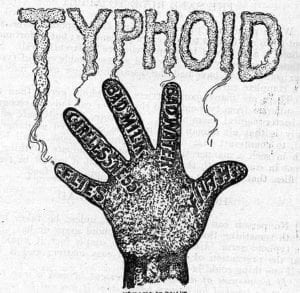 Typhoid has South Africa on high alert after two lives were claimed by the disease in its neighbouring country, Zimbabwe.
Typhoid has South Africa on high alert after two lives were claimed by the disease in its neighbouring country, Zimbabwe.
Clinics, other healthcare facilities, and health practitioners have been notified about symptoms of the disease. This information is also being shared with the public to help prevent catching the disease.
Symptoms include a fever, breaking out in a sweat or feeling very cold, headaches, abdominal pain, constipation or diarrhoea.
In the past, the disease has been widespread throughout many African countries.
Kerrigan McCarthy, head of outbreak response at the National Institute for Communicable Diseases (NICD) told media that an outbreak was not anticipated and that the NICD “will pick up each case of typhoid and ensure that appropriate investigations are done to prevent an outbreak”.
Some ways to prevent being infected with the disease include washing your hands before eating or preparing food, drinking safe, clean water, and avoid eating stale food.
Typhoid outbreak in Zimbabwe
McCarthy said the outbreak in Zimbabwe was “apparently caused by the contamination of water supplies”.
She explained that there was a breakdown of water supply due to the drought, as well as a breakdown of sewerage systems which led to the contamination of water. This resulted in large numbers of typhoid across Zimbabwe’s cities and rural areas.
South Africa has not had many cases on record, however
News24 noted that in 2013, there were 69 confirmed cases, and 115 in 2014, 81 in 2015 and 124 in 2016.
 Typhoid has South Africa on high alert after two lives were claimed by the disease in its neighbouring country, Zimbabwe.
Typhoid has South Africa on high alert after two lives were claimed by the disease in its neighbouring country, Zimbabwe.







